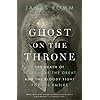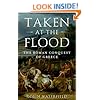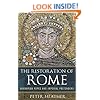



Dying Every Day: Seneca at the Court of Nero Hardcover – Deckle Edge, March 11, 2014

Don't have a Kindle? Get your Kindle here, or download a FREE Kindle Reading App.
Step right into Neil Patrick Harris's shoes in an exciting, interactive autobiography that places the reader squarely in the driver's seat. Learn more
Product Details
Would you like to update product info or give feedback on images?.
|
Editorial Reviews
From Booklist
Review
Praise for James Romm’s
DYING EVERY DAY
“Romm adeptly expounds the puzzle of Seneca’s life.”
-The New Yorker
“James Romm stitches this tapestry of evil together with a practiced hand.”
-Michael D. Langan, Buffalo News
“A splendid and incisive historical page-turner... This is how history should be written: vivid storytelling springing to life at a master’s touch... Romm’s narrative proves so compelling precisely because he concentrates on character, combining erudite scholarship with a novelist’s flair for telling detail. The result becomes an exception to the rule: When exercised with wisdom, dexterity and fervor, literary power shines as incorruptible.”
-Arlice Davenport, Wichita Eagle
“Thoroughly engaging and fascinating...A high-stakes drama, laced with murders, madness, and despotism...The highlight of the spring season.”
-Anne La Farge, Hudson Valley News
“Romm's compulsively readable account of imperial intrigues (incest, murder, suicide) brings contradictory visions of Seneca into three-dimensional focus.”
-Chronogram
“Romm's approach combines the commonly known with the fascinating, but more obscure. He makes a sustained point of showing Seneca as neither black nor white, neither totally deserving of his fate, nor so noble that all charges should drip off his well-oiled back. He shows different sides to the emperors as well and puts the women of the Caesars into their well-deserved positions of prominence…The fact that Romm presents the Stoic philosopher in this novel complex light and that he shows sides of the more famous that aren't common knowledge leaves me feeling [like] I got an awful lot out of reading it. Have I mentioned, I really, really liked this book?”
-N. S. Gill, About.com
“Historians from Seneca’s contemporaries through the present day have puzzled over his true character. Ascetic Stoic moralist or conniving courtier? Romm doesn't claim to settle the centuries-old mystery, but sheds light using ancient sources and occasional references to modern critics, joining his readers in marveling at a regime remembered by history for its shocking excesses.”
-Julia Jenkins, Shelf Awareness (Starred Review)
“Extensively researched. A book that will be welcomed by both scholars and those with a more casual interest in history. In addition and most important to our time is the detailed study of power politics and the inevitable consequences of weakness and corruption allowing power to be concentrated into few hands… An engrossing account of a time when rational thought was set aside in favor of passion and when good men cowed in the face of tyranny and did nothing to stem it.”
-Jeremy McGuire, New York Journal of Books
“A compelling, and terrifying, vision of a bloodthirsty, ruthlessly ambitious emperor and his court.”
-Jenny Yabroff, Biographile
More About the Author
Customer Reviews
Most Helpful Customer Reviews
Romm's new book is just as brilliant although it has a much narrower focus: the relationship between the Stoic philosopher Seneca and the infamous Roman Emperor Nero. Romm focuses on these two as his main characters with all else that was going on in the empire in the background. Using Seneca's own works and those of early Roman historians (Tacitus, Cassius Dio and Seutonius mostly) Romm paints Seneca as a complicated figure who is trying to live up to his Stoic morals, but usually falls short. Romm also shows how Seneca tried to rein Nero in as a young emperor and how their falling out led to Nero's descent into excess and his ultimate fall from power.
At no point in this book did I feel that a story I already knew was being re-hashed over again. Romm keeps a lively pace and the last few chapters are some of the most exciting reading I've come across in a history book in recent years.
I also enjoyed the time devoted to Nero's predecessor Claudius and his marriage to Agrippina, Nero's mother. Agrippina is an important side character in this history as well, and she is fleshed out just as well as Seneca and Nero are.
I highly recommend this book for all fans of Roman history. Even if you think you've read about Nero's fall this is an original window into Nero's reign from the view of the man who did his best (debatable) to live a minimalist lifestyle as a Stoic philosopher while at the same time hold immense power and influence, if only through Nero.
The central issue presented by Seneca's involvement with Nero is how could a Stoic seemingly dedicated to the moral life, eschewing great wealth, and denouncing tyranny, end up becoming wealthy, holding high office (consul) in a corrupt tyrannical government, and perhaps be an accessory to corruption and murder? This has been quite a hot topic apparently for students of Roman history for many generations. In approaching his examination of Seneca's conduct and activities, versus the image he tried to project, we learn a number of interesting things about how these Roman emperors and the ruling class operated.Read more ›
I can't tout the book as unreservedly as some of the comments, as I honestly learned little new about either Seneca or the period. This is not, I think, the best biography of Seneca, elucidation of his philosphy or history of the time. But it is well-written and engaging. Romm knows his stuff and provides a solid, popular narrative of an extraordinary period and figure(s), while puzzling over the complex, almost dueling personal character of Seneca as stoic philosopher and perhaps crass political actor. I would say that he has successfully targeted an audience for a spicy and dramatic real-life tale. No shame in that: Quite the contrary, he combines well-done popular history and good marketing, and likely will arouse further interest in Seneca, as well as a bit of thinking about the complications of combining political/ethical theory and high risk politics.
This highly recommended book can be read in two ways: Rapidly, as a real life power-and-crime drama, more fascinating than the "House of Cards" TV series. Or as a serious study posing one of the most fundamental problems of politics, namely the relations between a ruler and his advisors - in this case the Roman percepts Nero, as increasingly becoming deranged, and his stoic philosopher advisor Seneca.
Every ruler depends on advisors, both formal and informal ones. Therefore providing senior political leaders with morally and cognitively high-quality advisors serves as a main way to try and improve governance. Such advisors can be prepared by systematic study, such as at modern public policy schools, while the quality of politicians is largely a chance matter, depending on dynastic inheritance, elections, or party cliques. But this book demonstrates that this is very inadequate: The quality of politicians is critical and no advisor can serve as a substitute for it.
Nero was an immoral and in part evil ruler. Efforts by Seneca, while serving as teacher of young Nero, to shape his character failed, as was to be expected. But he continued as a main advisor of Nero, whose behavior contradicted the moral percepts of Stoicism. This created a harsh dilemma for Seneca, faced in real life by most of the few (because of tensions brought out in this book) highly moral advisors of rulers. As put by the author: "Seneca had made the bargain that many good men have made when agreeing to aid bad regimes. On the one hand, their presence strengthens and helps it endure.Read more ›











